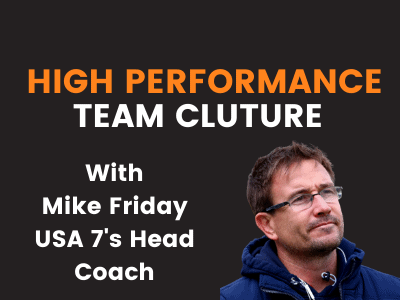We were able to take some time to talk with Mike Friday, the U.S.A. Rugby 7’s Head Coach about high performance and driving team culture. The focus of the discussion was what he feels non-professional athletes can take from professional athletes in all areas of performance.
1. What is the biggest problem you see with professionals learning skills, and how do you get them to learn faster?
“Skills need to be worked on every day, and they might be at the top of their game, and as a consequence they take their skills for granted, rather than recognise that actually if you keep the house clean every day, little and often, then the house never gets really, really messy. And you don’t have that blitz in pre-season where we work on our skills, or if we’ve had a really bad game, so the next week we work really hard on our skills because we think that’s the difference, rather than little and often to create habits and practice perfect technique which then allows you to have a great variance under pressure. Ultimately skills will be put under stress which means that perfect technique won’t necessarily get you through in that under pressure situation, but it will give you a great backbone and anchor to fall back on to adapt and adjust at those times under pressure.
I think taking your skills for granted is the biggest issue amongst professionals. When you look at those professionals who absolutely have excelled in a skills aspect, let’s talk about Johnny Wilkinson and his goal kicking. He was almost religious, or O.C.D., on it, probably too far, but the reality is he knew the importance of practising day in, day out, on those basics. Jason Robinson on his footwork. So, getting young players or players to consider to do that, first and foremost, is about changing habits and outset and that’s an element of education, and it’s also an element of giving them ways in which they can break down the skills into the microparts. If you take rugby as an example, you’ve got the macro element of passing the ball, but there are numerous sub-components of passing the ball which you need to get right, be it hand placement, be it grip, be it foot placement, be it use of the core, your arms, your wrists, your shoulders.
So, educating them and getting them to understand and appreciate the various aspects of that… that’s more of an educating part, rather than a telling part, so they know what to look for themselves, so they don’t feel like they’re wasting their time when they practice these mundane core skills. We do things like we partner them up so they can teach each other, so you’re not necessarily always focussing on you, but you are getting reflective learning, or a transferring learning, by the fact that you are helping someone else. We’ve done that with like-for-like athletes – rugby players who are at similar levels – but also we’ve done that on a mentor-mentee basis, with the senior pro and with the young academy player. So, they’ve got a project – the project might be the young academy player, but actually, they are the project as well because, by the same token, they will become more self-aware of what’s required and will practice with the youngsters.
It’s about working hard, and it’s an old fashioned quote, but hard work beats talent when talent doesn’t work hard. It is that straightforward.”
2. What can a non-professional player take from a professional player in terms of mental preparation before games?
“Like all younger athletes, they watch and look at what’s happened already. They look at players that are like-minded to them in personality. A lot of these routines will be evolved, not probably in competition, but in training times, in the locker room where we might have full metal jacket scrimmages, and they will see certain players do certain things. Within yourself, you know what works for you and what doesn’t, and I think as a coach, or the senior players with their mentoring, it’s guiding and if they see things or it looks like they are going wrong or they are just not doing it right, they are told. They are not told in a ‘you’re doing that wrong’, it’s ‘have you considered…’, ‘what about this?’ What it can’t be is ‘you’re not doing it right, you’re mucking about, you’re not thinking about what you’re doing’. The reality for these developing young players is “You don’t know what you don’t know.”
3. What is your thought process when developing new ideas, from drills, training, schedules and culture?
“Everything always evolves. There are some negotiables and non-negotiables on culture, and I create boundaries, and within those boundaries, you can bounce around however you like. But, the boundaries are human values, more about being a good man – not restrictive tight reins stuff. Within that, it’s about allowing them to evolve and create the personality for the group and then as a coach we have to mould ourselves around them, not them mould around you. We set the environment, in terms of what we expect in the standards, but ultimately they have to work with us to evolve and own them, so they work for the group. So, that’s kind of an ongoing, living, breathing thing – our culture. If you said to me ‘is our culture the same now as it was’ – no, it’s not, but our players aren’t, our men aren’t. They have all grown and become different. Likewise, some have left, and some have come in.”
4. What do you see at the amateur or semi-professional level that distinguishes the best high performer?
“Ultimately, the reason we have had the most success at any level is all around the ability to communicate, build relationships, compromise with one another and adjust and adapt to one another for the common purpose. And it’s about getting an alignment on and off the pitch, so that as a group of individuals, they enjoy the challenge of whatever the competition may be, enjoy each other’s company, want to work hard for one another, want to work hard for themselves and have an identity that they can relate to and an environment and a culture they can feel comfortable in but, at the same time, get a great sense of enjoyment from.
You will find your level on your ability, but whatever your ability is you will want to be in a room with a group of blokes, or women if it’s a women’s team, that are like-minded and are prepared to challenge you, but also support you at times of stress, times of sadness, but also times of happiness. I think back to the good times I had with Kenya, the good times I had with the U.S.A., the good times we had at Blackheath, the good times we had at London Welsh – it is all about that. It’s about being honest and authentic in that environment. It’s not always about being happy, clappy supporting one another. When hard words need to be said, they are said, and you take them in the spirit they are intended, and you make a conscious decision as a group that actually, this is the way forward for us.”
Thanks to Mike for taking the time to speak to The Athlete Tribe about culture and high performance. We wish him and his team all the best for the upcoming weekends on the 7’s Rugby series, check out their website here. We hope that you are able to take some developmental points from the interview. Let us know if you have any questions. Check out our key performance messages here to see what you can do to add to your high performance and culture.
Lee
Director & Founder
info@theathletetribe.com

